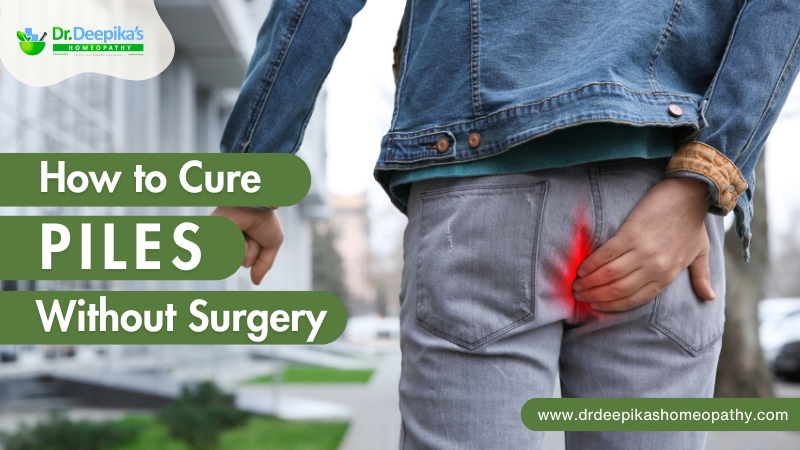
How to Cure Piles Without Surgery?
Piles, also known as hemorrhoids, can be a common and uncomfortable issue. The good news is, there are various treatment options available to manage symptoms and achieve relief, including best piles treatment in India. This article explores different treatment approaches, including homeopathic medicine for piles, to help you find the best solution for your needs.
Understanding Piles: Symptoms and Causes
Piles are swollen veins located in the rectum and anus. They can develop internally (inside the rectum) or externally (around the anus). Common symptoms of piles include:
- Pain or discomfort during bowel movements
- Bleeding during bowel movements
- Itching or burning around the anus
- A feeling of fullness in the rectum
- A lump near the anus
Several factors can contribute to the development of piles, including:
- Straining during bowel movements
- Chronic constipation or diarrhea
- Pregnancy
- Obesity
- Lifting heavy objects
Addressing Piles: Treatment Options
If you’re experiencing piles, it’s important to consult your doctor for a proper diagnosis and discuss treatment options. Here’s an overview of some common approaches:
Lifestyle Modifications:
Making simple lifestyle changes can significantly improve symptoms and prevent future flare-ups. This includes:
- Increasing fiber intake: A diet rich in fiber helps soften stool and reduce straining during bowel movements.
- Staying hydrated: Drinking plenty of fluids helps keep stools soft and easier to pass.
- Maintaining a healthy weight: Excess weight can put additional pressure on the rectal veins.
- Exercising regularly: Regular physical activity promotes healthy digestion and bowel regularity.
Homeopathic Medicine for Piles
Homeopathy offers a natural approach to managing piles. Homeopathic remedies are formulated from natural substances diluted and potentized to stimulate the body’s self-healing mechanisms. A qualified homeopath will consider your individual symptoms, medical history, and overall health when selecting the most appropriate remedy. Some commonly used homeopathic remedies for piles include:
- Nux vomica: For piles associated with constipation and straining.
- Hamamelis virginiana: For piles with bleeding and burning sensation.
- Aesculus hippocastanum: For piles with a feeling of heaviness and congestion in the rectum.
Benefits of Homeopathic Treatment for Piles
Gentle and Natural Relief
- Homeopathic remedies offer a gentler and more natural approach to relieving symptoms compared to some conventional medications. These remedies are derived from natural substances and are prepared in a way that makes them safe for most people to use.
- Homeopathic treatments for piles include remedies like Aesculus, Hamamelis, and Nux Vomica, which are tailored to the individual’s specific symptoms and overall health condition.
Minimal Side Effects
- Homeopathy generally has minimal side effects, making it a suitable option for many people, including those who may be sensitive to conventional medications.
- Since homeopathic remedies are highly diluted, they typically do not cause the adverse reactions that are sometimes seen with stronger pharmaceutical drugs.
Addresses Underlying Causes
- Homeopathic treatment aims to address the underlying causes of piles, not just suppress symptoms. This holistic approach can lead to more sustainable relief and improved overall health.
- By focusing on the root causes, such as digestive disorders, constipation, or lifestyle factors, homeopathy seeks to prevent the recurrence of piles.
Conventional Medical Treatment
For those who need immediate relief or have severe symptoms, doctors may recommend conventional treatment options. These options vary depending on the severity and type of piles.
- Over-the-Counter Medications
- Creams, Ointments, and Suppositories: These can provide relief from itching, burning, and pain associated with piles. They often contain ingredients like hydrocortisone, witch hazel, or lidocaine to reduce inflammation and discomfort.
- Pain Relievers: Oral pain relievers, such as acetaminophen or ibuprofen, can help manage pain and swelling.
- Minimally Invasive Procedures
- Rubber Band Ligation: This procedure involves placing a small rubber band around the base of a pile to cut off its blood supply, causing it to shrink and fall off.
- Sclerotherapy: In this procedure, a chemical solution is injected into the piles, causing them to shrink. This is often used for smaller, internal piles.
- Infrared Coagulation: This technique uses infrared light to coagulate the blood supply to the piles, causing them to shrink.
- Surgical Treatments
- Hemorrhoidectomy: This is a surgical procedure to remove large or severe piles. It is usually recommended when other treatments have not been effective.
- Stapled Hemorrhoidopexy: This surgery involves stapling the piles back into place and cutting off their blood supply, which causes them to shrink. It is typically less painful than a traditional hemorrhoidectomy and has a quicker recovery time.
- Over-the-Counter Medications
Combining Treatments for Optimal Results
- For some patients, a combination of homeopathic and conventional treatments may be the best approach. Homeopathy can be used to address the underlying causes and provide long-term relief, while conventional treatments can offer immediate symptom relief.
- Always consult with a healthcare professional before starting any treatment plan to ensure it is safe and appropriate for your specific condition.
Homeopathy vs. Allopathy: A Collaborative Approach
Both homeopathy and allopathy offer valuable treatment options for piles. Here’s a positive take on homeopathy:
- Homeopathy offers a gentle and natural approach, suitable for those seeking alternatives to conventional medications.
- Homeopathic remedies can address the underlying causes of piles, potentially leading to long-term relief.
- Homeopathy can be used alongside conventional treatments, providing a more comprehensive approach to managing piles.
Choosing the Right Treatment
The best treatment for piles depends on the severity of your symptoms, your overall health, and your personal preferences. Consulting your doctor is crucial to discuss treatment options and determine the most suitable approach for your specific situation.
Conclusion
Living with piles can be uncomfortable, but there are effective ways to manage the symptoms and achieve relief. By exploring options like homeopathic medicine for piles, lifestyle modifications, and potentially conventional treatments, you can find the path to healing and experience renewed comfort. Remember, early intervention and open communication with your doctor are key to achieving optimal results.